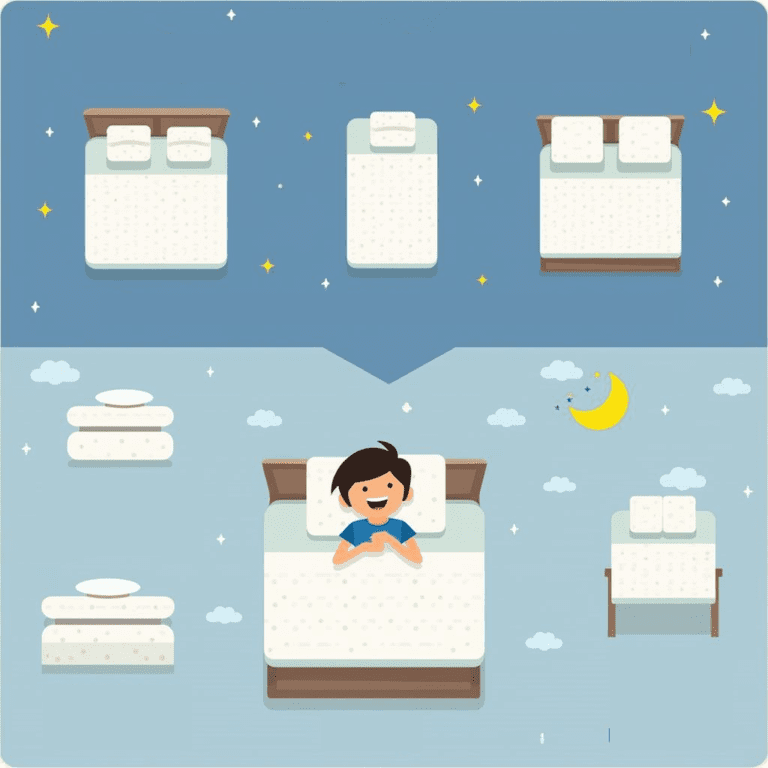Sleep Environment Tips for Better Productivity: Simple Changes, Big Results
In today’s fast-paced world, the importance of a good night’s sleep cannot be overstated. Quality sleep is crucial for maintaining high productivity levels throughout the day. However, creating an optimal sleep environment often gets overlooked. In this article, we will explore effective sleep environment tips for better productivity. By implementing these simple changes, you can experience big results in your overall performance and well-being.
Understanding the Importance of Sleep for Productivity
Before diving into specific tips, it’s essential to understand why sleep is so crucial for productivity. Studies indicate that quality sleep is linked to improved cognitive functions such as memory, creativity, and problem-solving abilities. Lack of sleep can lead to decreased attention spans, emotional instability, and even physical health issues. By enhancing your sleep environment, you foster better sleep quality, which directly contributes to increased productivity during your waking hours.
1. Optimize Your Sleep Space
The first step in creating an effective sleep environment is to optimize your sleep space. This involves several elements:
- Comfortable Mattress and Pillows: Invest in a high-quality mattress and pillows that support your sleeping positions. A comfortable bed reduces discomfort and allows for deeper sleep.
- Temperature Control: Keeping your bedroom cool, around 60-67°F (15-20°C), is ideal for sleep. Consider using fans or adjusting your thermostat as necessary.
- Minimal Clutter: A clean, organized space can help reduce anxiety and create a peaceful atmosphere conducive to sleep.
2. Eliminate Distractions
One of the most critical sleep environment tips for better productivity is to eliminate distractions. Here are some effective ways to minimize interruptions:
- Block Out Light: Use blackout curtains or an eye mask to prevent light from disrupting your sleep. Light can interfere with your circadian rhythm and lead to less restorative sleep.
- Noise Reduction: Consider using white noise machines, earplugs, or soundproofing your room to block out disruptive noises that can interrupt sleep cycles.
- Limit Technology: Keep electronic devices away from your bedside and minimize screen exposure at least an hour before bed. The blue light emitted from screens can hinder melatonin production and disrupt sleep.
3. Establish a Relaxing Pre-Sleep Routine
A calming pre-sleep routine can signal to your body that it’s time to wind down. Implementing a regular routine can significantly improve the quality of your sleep:
- Engage in Relaxation Techniques: Activities like reading, meditating, or practicing gentle yoga can help relax your mind and body.
- Aromatherapy: Using calming scents like lavender or chamomile can create a serene atmosphere. Consider essential oils, sprays, or scented candles to promote relaxation.
- Consistent Sleep Schedule: Going to bed and waking up at the same time every day helps regulate your body’s internal clock and improves the quality of sleep.
4. Enhance Your Bedroom Environment
In addition to optimizing your sleep space, enhancing your bedroom environment can significantly impact your sleep quality. Consider these factors:
- Color Palette: Soft, muted colors such as blues, greens, and pastels can create a calming effect in your bedroom, promoting a peaceful sleep environment.
- Quality Bedding: Choose breathable, high-thread-count sheets and comfortable blankets that can help regulate body temperature.
- Personal Touches: Incorporate elements that make you feel relaxed and happy, such as artwork, plants, or photographs.
5. Monitor Your Food and Drink Intake
Your diet can also play a significant role in your sleep quality. Here are some considerations:
- Avoid Heavy Meals: Eating large meals close to bedtime can disrupt sleep. Aim for lighter meals if you’re hungry in the evening.
- Limit Caffeine and Alcohol: Both substances can hinder your ability to fall and stay asleep. Try to avoid consuming these, especially in the hours leading up to bedtime.
- Stay Hydrated: While it’s important to drink enough water, try to limit fluid intake near bedtime to prevent nighttime awakenings.
6. Invest in Sleep Technology
In this tech-driven age, numerous products can enhance your sleep environment. Consider the following:
- Smart Mattresses: Many high-tech mattresses adjust firmness and temperature and track sleeping patterns to help tailor your sleeping experience.
- Sleep Apps: Utilize apps that track sleep patterns or offer guided meditations and relaxation techniques to promote better sleep.
- Wearable Devices: Fitness trackers can monitor your sleep cycles and provide insights into your sleep quality, helping you make necessary adjustments.
7. Seek Professional Help if Necessary
If you’ve tried various strategies and still struggle with sleep, consider seeking professional advice. Sleep disorders such as insomnia or sleep apnea require specialized treatment. Consulting with a sleep specialist can provide tailored solutions to help you achieve better quality sleep, ultimately leading to improved productivity.
Conclusion
Enhancing your sleep environment is a crucial aspect of improving productivity. By making simple changes to your bedroom and daily habits, you can create a space that promotes quality sleep. From optimizing your sleep space to eliminating distractions and monitoring your diet, these sleep environment tips for better productivity can pave the way for significant improvements in your overall well-being and performance. Make the commitment to prioritize your sleep and watch as it transforms your daily productivity in remarkable ways.







